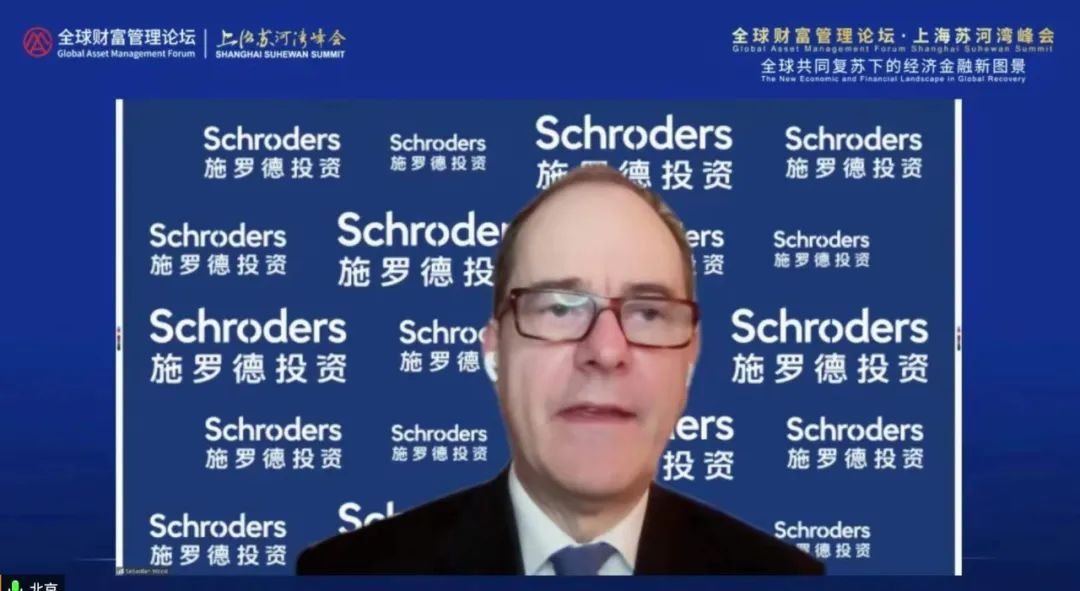施罗德投资:关于今年全球经济增长的思考及判断

施罗德集团中国业务主席吴思田爵士(Sir Sebastian Wood)近日出席全球财富管理论坛上海苏河湾峰会时,就技术创新、可持续发展及气候变化等全球经济复苏进程中的重点议题发表演讲。
吴思田爵士表示,虽然复杂多变的疫情仍将对世界经济复苏带来一定的不确定性,但全球经济仍将在2022年维持温和增长。他指出,为确保全球经济行稳致远,当务之急是需要各方齐心协力,共同解决区域间及各国内部的贫富差距问题。同时,面对供应链瓶颈、刺激政策的大规模退出、主要经济体央行陆续加息等现状,吴思田爵士认为,经济动能即将从疫情期间的政策驱动向后疫情时期的市场驱动切换,并判断这一切换或将利好2022年的债券及外汇市场。另外,吴思田爵士以新冠疫苗研发为例,表示技术进步能在短时间内极大提振生产率,市场参与者可在这方面进行资金配置。针对气候变化问题,吴思田爵士认为,随着各国ESG相关的规范不断深化落地,市场参与者应重点关注组织信息披露、产品信息披露及市场对“可持续”的分类概念统一这三个方面。基于施罗德长达218年的投资实践,吴思田爵士总结到,除了投资风险、投资回报之外,市场参与者还应注重投资影响这第三个投资维度。最后,他还表达了施罗德将继续积极参与中国在可持续投资及绿色金融领域的合作交流。
以下为演讲全文。

向各位分享一下施罗德对当前经济形势的看法,并在此基础上聊聊全球经济合作的重点领域,例如支持技术创新、实现联合国可持续发展目标以及应对气候变化。
奥密克戎变异株的出现提醒我们,全球疫情仍存不确定性。尽管如此,随着全球经济持续复苏,我们依然看好今年的经济增长。当然,鉴于各国政府和央行为疫情初期提供的大规模刺激力度开始减弱,与2021年的强劲增长相比,今年的经济增长将有所降温。
世界经济正从疫情冲击中复苏,但进展参差不齐。整体而言,发达经济体的表现优于新兴经济体。疫情暴露出的另一个问题是经济体内部的不平等,无论从是收入还是财产视角衡量,不平等都在加剧。如果这一问题不得到解决,经济体内部的不平等可能会产生棘手的后果,并可能降低国内民众对经济开放的支持。甚至在疫情爆发之前,各国政府就一直在努力以各种方式解决这一问题。例如,英国政府正在推行的“均衡化”议程。中国政府正在推行旨在降低住房和教育成本、增加家庭收入的政策。缩小贫富差距是经济长期稳定增长之基,疫情促使我们要即刻化解这一挑战。
后疫情时期的经济复苏与以往的危机复苏有所不同。供应链瓶颈和劳动力短缺叠加,导致通货膨胀和工资涨幅超出了预期。把通胀降回理性区间的过程中,政策制定者和投资者将面临一系列的挑战。以2021年全球GDP增长率5.6%为基点,我们预计2022年全球GDP增长率或降至4.0%。全球通胀率预计将从2021年的3.4%抬升至2022年的3.8%。另外,经济复苏之所以参差不齐,本质上要归因于商品供给短缺,而非服务业低迷。供给端的阻滞已对供应链和大宗商品市场带来了较大压力。2009年全球金融危机结束后,商品的供给端用了四年半的时间才达到产能饱和,而这一次,则仅仅花了十八个月,便出现了供不应求的情况。
我们预计,各国央行及政府的各项应急刺激政策逐渐退出,将成为塑造2022年经济活动的主要因素。美国与英国正逐渐缩减针对疫情的大规模财政刺激。相比之下,欧元区的情况更加引人注目,原因在于欧洲推出了复苏计划,预计将保持强劲的财政支出。货币方面,我们也看到美国和英国都在朝保守方向回撤。各国央行正在结束与疫情有关的量化宽松,因为所释放的大部分流动性都被直接注入到了金融体系。英格兰银行和美联储也准备加息。事实上,英格兰银行已经开始这么做了。
施罗德预计,美国-英国和欧元区-中国的政策差异将为债券和外汇市场创造机会。
要维持增长,就得从各国政府和央行拉动向私营部门拉动切换。问题是,私营部门能堪重任么?在这方面,消费者是问题的关键。我们正在观察家庭是否会将疫情封锁期间积累的储蓄用于消费。实际上,若超额储蓄被用于消费,这意味着储蓄率要下降到低于7.5%的疫情前均值。2021年,美国储蓄率已显著下降,但想在2022年提振消费,保持储蓄率合理地持续走低至关重要。欧元区和英国的情况类似,但我们估计,这些经济体中的家庭已开始消耗额外的储蓄。同时,我们判断,中国当前的家庭额外储蓄实际上还低于西方国家。
技术加速发展可能是一个积极的长期因素。在它的作用下,有望提振生产率的增长。技术创新也可以将可持续发展目标变为现实。让我们以新冠疫苗的研发为例。公共部门的支持必不可少,但最终还要靠那些具备尖端能力的市场化企业来研发有效疫苗,以对抗病毒。疫苗研发方面的成功表明了创新的重要性。私营部门现在有机会通过推出新产品和解决方案展示自己的价值,从而推动可持续的未来变成现实。投资者们也可以采取“用脚投票”的方式支持那些有助于找到解决方案的公司,从而产生积极的影响。
随着应对气候变化的力度不断加大,环境问题越来越受到关注。各国发布了大量的ESG新规可能令市场参与者们措手不及。因此,回归本源、求同存异,将有助于加强跨地区、跨主权的合作。政府关于ESG的条文体例可能有一大堆,但删繁就简,大家普遍关注的是以下三个核心焦点:
一、组织信息披露:确保投资者拥有配置资本所需的信息;
二、产品信息披露:帮助投资者分辨哪些产品将在可持续方向配置资金,或能引导投资标的在未来进行可持续发展;
三、分类概念统一:让市场就“可持续”概念达成共识。
亚洲一贯重视对信息的集中化处理。例如,韩国证券交易所开设了一个部门,专司“社会责任”相关的债券;在中国香港特别行政区,监管机构的网站上有一个公开的可持续发展基金数据库;而新加坡的监管机构已宣布计划进行数字平台试点,以处理那些有利于可持续发展的数据。去年11月,可持续金融国际平台分类工作组发布了中欧《可持续金融共同分类目录报告:减缓气候变化》。这一深入对比确定了欧盟和中国分类法之间的共性和差异,预计将提高全球可持续金融标准的可比性和互通性。《可持续金融共同分类目录报告》的发布,是国际可持续金融合作的一个里程碑,将有助于全球分类的协调和标准化,造福全球投资者。
就施罗德而言,我们为自己作为可持续投资领域领积极的实践者而感到自豪。除了投资风险和投资回报,我们还考虑了投资的第三维度,即投资影响。只有综合考虑这三个要素,并将其纳入到我们的投资流程,我们才能真正发现标的所蕴含的投资潜力。随着中国不断促进资本市场在实现碳减排目标过程中所发挥作用,施罗德希望进一步拓展与政策制定者和监管机构在可持续投资以及绿色金融领域的交流。

Speech at GAMF 2022 Shanghai Summit
Sir Sebastian Wood
I want to provide the assessment from Schroders' perspective of economic backdrop and talk a little bit about key priority areas for our cooperation such as supporting technological innovation, realizing the UN's Sustainable Development Goals (SDGs), and tackling climate change.
The emergence of the Omicron Covid variant has reminded us of the uncertainties, which remain around the global pandemic. Despite these, we expect this year to be another good year for growth as the global economy continues its recovery. We do, however, see growth cooling by comparison with very strong 2021, as the massive support offered by governments and central banks during the pandemic's initial stages as that support begins to fade away.
The world economy is emerging from the great lockdown, but progress is not even. And the overall picture is one of developed markets currently out-performing emerging markets. The other fault line opened up by the pandemic has been inequality within economies which is probably increased on both an income and wealth metric. If this is left unaddressed, inequality within economies can have difficult political consequences and can reduce support for economic openness. And even before the pandemic governments had been pursuing efforts to tackle this in various ways. The UK government, for example, is pursuing an agenda of "leveling up". The Chinese government is pursuing policies aimed at reducing the cost of housing and education and increasing household incomes. The pandemic adds to the urgency of this challenge as a basis for long term healthy growth.
The economic recovery following the pandemic has differed from economic recoveries of the past. Bottlenecks and shortages have pushed inflation and wage rates higher than expected. Inflation should moderate, but policymakers and investors face a difficult period in the interim. Our forecast is for 2021 global GDP growth of 5.6% to be followed by 4.0% growth in 2022. We see global inflation at 3.4% for 2021 and rising to 3.8% in 2022. The unbalanced recovery has disproportionately been driven by the goods sector instead of services, and this has created extraordinary pressure on supply chains and commodity markets. It took four and a half years for retail sales volumes to surpass previous levels by this degree after the Global Financial Crisis had ended in 2009. On this occasion it has taken 18 months.
We expect the withdrawal of emergency levels of support by central banks and governments will play an important role in shaping economic activity this year. The massive fiscal stimulus policies in response to the pandemic are already winding down in the US and UK. In contrast, the Euro zone stands out as fiscal spending is expected to remain strong due to the EU's Covid recovery plan. With regard to monetary support, we also see a move in a less positive direction in the US and UK. Here central banks are ending pandemic related quantitative easing programmes, which have been used to inject money directly into the financial system. The Bank of England and US Federal Reserve are also poised to raise interest rates. Indeed, the bank of England has already begun to do so.
We expect the divergence of policy outcomes between the US/UK on the one hand, and Euro zone/China on the other to create opportunities in bond and foreign exchange markets.
For growth to be maintained, we need to see demand from the private sector taking over the government and central banks. So the question is, can private demand really step up? On this front the consumer is critical and here we are looking for households to spend the savings they accumulated during lockdowns. In practice this would mean a fall in the savings ratio below its pre-pandemic average of 7.5% as excess savings are spent. The US savings rate has already fallen significantly in 2021, but it is critical for consumption that it continues to decline in 2022. The story in the Euro zone and UK is similar although we estimate that households in these economies are at an earlier stage in running down their excess savings. We also believed there are less excess savings in China than in the West of the moment.
The acceleration in technological development is potentially a positive, a long term factor. It holds up the promise of stronger productivity growth.
Technology innovations can also turn the Sustainable Development Goals (SDGs) into reality. Let's use the development of Covid-19 vaccines as an illustration. Public sector support was an essential part of the picture, but ultimately it was the individual companies who had the scientific expertise to turn their cutting-edge capabilities into effective vaccines against the virus. The success of the vaccines shows the importance of innovation. This is an opportunity for the private sector to show its value in coming up with new products and solutions to make a sustainable future a reality. Investors can also make a positive impact by using their capital to support companies who contribute to finding these answers.
Environmental issues have come into increasing focus with greater efforts to tackle climate change. The volume of ESG new rules emerging around the world may feel overwhelming or even intimidating. Thus, for better cooperation across regions and jurisdictions. We need to revisit the basics and look at the commonalities among these rules. Policymakers may have a long list of things on their agendas but invariably target three core areas:
1. Company Disclosures: to ensure investors have the necessary information to allocate capital;
2. Investment Product Disclosures: so that people can easily identify which products are more likely to allocate capital to sustainable activities or activities that can make the journey to sustainability ;
3. Taxonomies: for the markets to have a common understanding of what "sustainable" means.
In Asia, there has been a strong focus on bringing relevant information in one place. For example, the Korean Exchange has a dedicated segment for socially responsible bonds; in Hong Kong SAR there is a publicly available database of sustainability funds on the regulator's website; while the regulator in Singapore has announced plans to pilot digital platforms for better sustainability data. In November last year, the International Platform on Sustainable Finance (IPSF) taxonomy working group unveiled the "EU-China Common Ground Taxonomy: Climate Change Mitigation (CGT)". This in-depth comparison identifies commonalities and differences between the EU and China's taxonomies and is expected to improve the comparability and interoperability of global sustainable finance standards. The release of the Common Ground Taxonomy marks a milestone of international cooperation on sustainable finance and will be instrumental in worldwide taxonomies harmonization and standardization, benefiting those who invest globally.
For our part that Schroders, we are proud of our reputation as a leading practitioner of sustainable investment. Alongside risk in return, we consider a third dimension, impact risk, which is embedded into our investment process. Only by considering these three pillars together can we uncover a company's real investment potential. We are keen further to develop our dialogue on sustainable investment and green finance with regulators and policymakers as China seeks to harness the power of capital markets as it pushes its carbon reduction goals.
全球财富管理论坛

全球财富管理论坛是在金融开放背景下,为顺应全球资产管理行业发展与中国资产管理行业转型需求,由清华大学经济管理学院、孙冶方经济科学基金会、中国财富管理50人论坛联合发起成立的一个国际性交流平台组织,论坛旨在构建一个汇聚全球资产拥有者和管理者、监管部门和市场代表的长期对话沟通平台,为国内外资产管理机构搭建交流与合作的桥梁。

